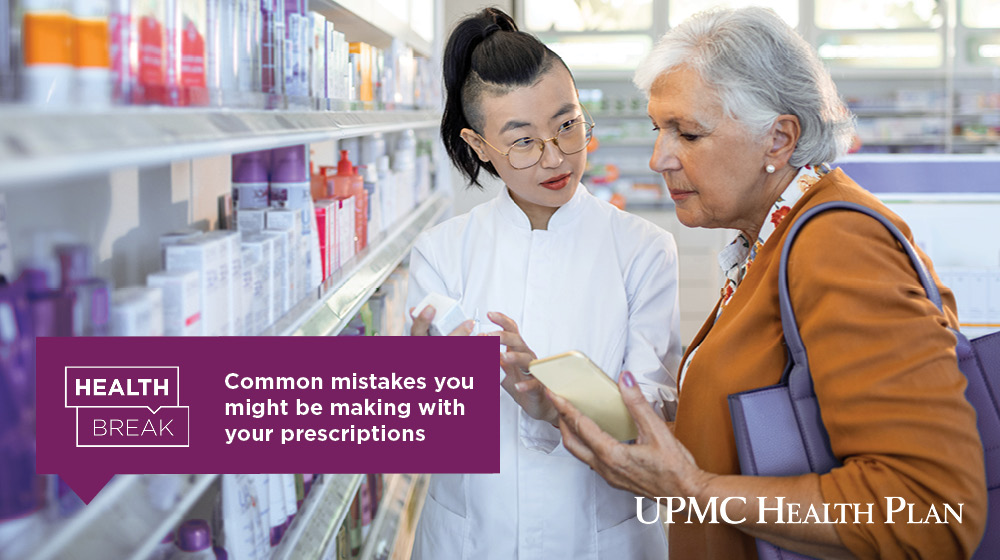Health Break: Common mistakes you might be making with your prescriptions

A podcast for UPMC Health Plan members, Health Break is your quick guide to caring for your mental and physical health, prioritizing wellness, and making the most of your health insurance plan.
Episode 7: Take a Health Break with Teresa Messick
Teresa takes a Health Break to share common mistakes you might be making with your prescriptions and how to correct them. Plus, we’ll talk about how to avoid prescription misuse.
Episode transcript:
Camille: Welcome to Health Break by UPMC Health Plan, your quick guide to health, wellness, and how to make the most of your health insurance plan. Listen during your coffee break, lunch break, or anytime you need a break. I’m your host, Dr. Camille Clarke-Smith. I help to oversee the quality of the plans we offer at UPMC Health Plan.
Alex: And I’m your co-host, Alex Treanor. I’m a senior health coach who works with our members on healthy lifestyle habits and goals. This is your… Health Break.
Camille:Hey! This is Dr. Camille Clarke-Smith. Today we’re joined by Teresa Messick, who will share some common mistakes that you might be making with your prescriptions and how to correct them.
When we talk about prescriptions, what’s the difference between a prescription drug versus an over-the-counter drug?
Teresa: A prescription drug is a medication that legally requires an order from a provider, also known as a prescription. These medications, of course, can be used to treat or manage disease states or illness. Some examples based upon disease state: [For] asthma or COPD, we have our inhalers. For the heart, we have various heart and blood pressure medications depending on condition. For diabetes, our injectable or oral options. And of course, our antibiotics. In contrast, an over-the-counter drug does not require a prescription order and can be obtained anytime, wherever they’re sold—places such as pharmacies or other stores. Often a provider will order an over-the-counter medication for a patient, too. One thing to keep in mind, herbals and supplements can also be obtained over-the-counter without a prescription. And even though these over-the-counter products are readily available, it’s best to always check with your provider before taking or adding an over-the-counter herbal or supplement to your regimen. Over-the-counter herbals and supplements can have drug interactions. Also, there may be a product that is okay to take for one patient, but there are certain situations where some patients may need to avoid that product. It’s best to always check with your provider to be sure an over-the-counter product is the best and safest option for you.
Camille: It sounds like it could be easy to make some mistakes when managing our prescriptions. Can you tell us about how we can make sure we’re using our prescriptions as safely as possible?
Teresa: Sure. Common mistakes [are] skipping doses or doubling up on doses if you skipped. I hear this so much when speaking with members that they accidentally missed or skipped a dose or are unsure if they took their medication. I cannot stress enough how important it is to try not to miss or skip even one dose of any medication, unless of course advised by your provider. Using things such as pill boxes or setting alarms are helpful tools to stay on track with taking your medications as prescribed. Certain pharmacies also do offer additional services such as auto refill or special packaging. Really, it’s so important. Check in with your pharmacy, see if they have any of these capabilities that can kind of help to keep you on track. It is best to always talk to your provider if you missed or skipped any doses. Depending on the medication, how many doses may have been missed or skipped, there may be different ways to manage the missed or skipped doses. Since these scenarios can be so unique, it’s always advised to make your provider aware of the missed or skipped dose and follow their direction on how to manage the situation.
Camille: How important is it to be mindful of a missed or skipped dose?
Teresa: It’s so, so important and you know, missing or skipping a medication dose or several may actually impact how well the medication is working for you and has potential, unfortunately, to cause harm. It is so important to connect with your provider if a dose is missed or skipped. Often, medication doses are gradually increased over time to work up to your specific dose. Abruptly stopping a medication without consulting your provider can be potentially harmful. For example, oftentimes providers take this approach with medications that help to treat high blood pressure. If these medications are abruptly stopped without talking to your provider, it could lead to symptoms such as dizziness, headache, or rapid blood pressure elevations.
I’d also like to point out, if you are experiencing what you think may be a side effect from a medication, outreach to your provider, discuss with them your concerns before ever stopping the medication on your own. Keep in mind your provider is on your team. They want to help find a regimen that is best for you. Often, there are similar medications with similar benefit that may be better for you as an individual. Suddenly stopping a medication on your own without provider advisement may be unsafe.
Another common mistake is not finishing your medication as prescribed because you feel better. It’s great that you’re feeling better, but most medications like antibiotics to treat an infection require completion of the full course of the medication to work properly. Not finishing your medication as prescribed, even if you feel better, may not fully treat the infection, and you may need additional treatment later. Also, by stopping the course early, you may be contributing to resistance for the bug, which means the anti-infective that is working now may over time not work to treat the infection in the future. Also, there are certain medical conditions where you may not have any obvious symptoms. It is important to continue to follow provider advisement on your prescribed regimen.
Camille: Wow. That’s a lot to think about, and maybe a lot of common mistakes that we’re making. I have to make sure I see my provider the next time I think about switching my medication. What would you say are some of the best practices we can take when managing medications?
Teresa: Yeah, great question. I’ve actually got a few. First, avoiding misusing medications. Drug misuse can have such serious consequences. Some factors impacting prescription safety include types of medications, dosages, other substance use, and individual patient health factors. It is important that you are open and honest with your providers if you are misusing a medication so that they can best care for you. So some ways to avoid misusing medications: First, be sure to take your medications exactly as prescribed. Also, keep your medications in a safe place, separate from others’ medications, and not sharing medications with others. Another way to avoid misusing medications is avoiding the use of medications for any other use other than the reason it was prescribed.
Some additional best practices include always, always keep an up-to-date medication list with you. This will help at office visits with your providers, but also can help in case of emergency. Do not stop start or change medications without first talking to your provider. If a change is made from one of your providers, make your other providers aware. Use pill boxes and alarms to avoid missing or skipping doses. Pill boxes are helpful especially if you forget you took your medication. You can always check back to see if those tablets are still in your pill box for that day. And then finally, always, always let your provider know if you have any concerns, if you think you’re having a side effect, or if you have any barriers at all to getting your medications.
Camille: Thank you so much, Teresa, for taking a Health Break with us today.
Teresa: Thank you.
Camille: If you are a UPMC Health Plan member and would like to talk to a pharmacist about your medications, click on the link in the show notes!
Find show notes and more information at upmchealthplan.com/podcast. Join us as we explore other health and wellness topics in the next episode of Health Break.
This podcast is for informational and educational purposes. It is not medical care or advice. Individuals in need of medical care should consult their personal care provider. Views and opinions expressed by the hosts and guests are solely their own and do not necessarily reflect those of UPMC Health Plan and its employees.
Related to this episode:
- Check your prescription drug formulary to make sure your medications are covered.
- Sign up for a personal review of your medications.
- Find a pharmacy based on your pharmacy benefits.
- If you are a UPMC Health Plan member who has questions about your medications or needs help filling your prescriptions, please call us at 1-844-800-9406. You can call us Monday through Friday from 9 a.m. to 7 p.m. and Saturday from 9 a.m. to 4 p.m. TTY users can call 711.
About Teresa Messick:

Teresa Messick is a clinical pharmacy supervisor at UPMC Health Plan with over 10 years of professional pharmacy experience. After graduating from the Duquesne University School of Pharmacy, Teresa worked as a clinical program coordinator and clinical consultant in community pharmacy settings in Virginia and North Carolina. Teresa has been with UPMC Health Plan since 2019. In her current role, she supports and oversees her team who works telephonically with our members to help them get the best results from their medications.
About Dr. Camille Clarke-Smith:

Camille Clarke-Smith, EdD, is a program director in the Quality Improvement, Medicare Stars Department at UPMC Health Plan, where she leads the Medicare Faith and Wellness Program, a 3- to 12-week health and wellness challenge. She is also the founder of the nonprofit Transforming the Health of African American Women (THAW) Inc. She earned a doctorate in health and physical activity education from the University of Pittsburgh in addition to a master’s in exercise science and a bachelor’s in psychology and sociology. She is currently pursuing her master’s degree in social work at Carlow University.
About Alex Treanor:

Alex Treanor is a lead health coach at UPMC Health Plan. As a lifestyle health coach, she specializes in helping you lose weight, eat healthy, get more physical activity, be less stressed, and quit tobacco. Alex has a master’s in Kinesiology, Integrative Wellness from Point Loma Nazarene University. She has been coaching since 2014 and is a Nationally Board Certified Health & Wellness Coach and Certified Personal Trainer. Alex is passionate about helping people improve their relationship with food and exercise while creating healthy, sustainable routines filled with enjoyment. Alex enjoys spending time with her husband, walking with her dog, and eating tacos in the sunshine.



